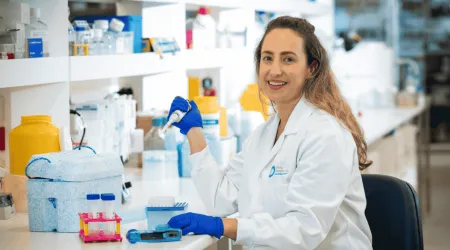
Alliance Releases 2018 Young-Onset Colorectal Cancer Survey Report

Nearly three-quarters of young-onset colorectal cancer patients are diagnosed with an advanced stage of the disease, a significantly higher percentage than has been reported for their more mature peers, according to a report from the Colorectal Cancer Alliance (Alliance).
The Young-Onset Colorectal Cancer Survey Report, which highlights the experiences of patients, survivors, and caregivers, shows an acute need to increase understanding about young-onset colorectal cancer among the general population and physicians, especially primary care doctors who first see patients.
“Once again, our data suggests a gap in awareness about the symptoms and risks of colorectal cancer in people under age 50, both in doctor’s offices and at home,” said Dr. Ronit Yarden, the Alliance’s director of medical affairs.
Colorectal cancer patients are considered young-onset if they are diagnosed before they turn 50 years old. In the United States, 11 percent of colon cancer diagnoses and 18 percent of rectal cancer diagnoses occur in those under 50.
The Alliance’s study shows that 71 percent of young people with colorectal cancer are diagnosed at advanced stages of the disease, stages III or IV. This is significantly higher than the 60 percent reported for late-stage diagnoses in the overall colorectal cancer patient population, the majority of whom are over 50 years old.
Many respondents were initially misdiagnosed, the study shows. Sixty-seven percent of patients reported seeing at least two physicians, and some more than four physicians, before they were diagnosed correctly with colorectal cancer.
The study also highlights a tendency among patients of waiting to see doctors after symptoms occur. Forty-one percent of patients reported waiting at least six months after the initial presentation of symptoms to talk to a doctor. Many then received an initial misdiagnosis.
Receiving a misdiagnosis affords the disease more time to grow and spread, possibly contributing to a higher percentage of diagnoses at advanced stages among patients under 50 years old.
In a bright spot, the 2018 report shows more participants were referred by their primary care physicians for colonoscopies than in 2017, which could represent a positive trend of increased awareness.
“This disease is highly preventable with screening and highly treatable if caught early, but patients and the medical community must know that you’re never too young for colorectal cancer,” said Kim Newcomer, Never Too Young program manager at the Alliance.
The survey, which is in its third year, lets the Alliance learn about and track the self-reported medical, psychosocial, and quality of life experiences of young-onset patients and survivors. This year, for the first time, the survey also tracked the experiences of caregivers.
Key statistics: Patients and survivors
- The survey reports includes data from 1,622 people, including 1,195 patients/survivors and 427 caregivers.
- 75 percent had colon cancer and 25 percent had rectal cancer.
- 41 percent waited at least six months after experiencing symptoms before talking to a doctor.
- 71 percent were diagnosed at a later stage (stages III or IV).
- 67 percent saw at least two physicians before being diagnosed correctly with colorectal cancer.
- 85 percent experienced anxiety or depression during or after treatment.
- 80 percent had children under the age of 18 when diagnosed.
- 62 percent were not aware of clinical trials.
Key statistics: Caregivers
- 75 percent of health care professionals did not provide any information about young-onset colorectal cancer support groups or organizations.
- 59 percent of caregivers said their loved one experienced changes in their ability to perform expected social tasks, including those of a spouse, child rearer, friend, or worker.
- 55 percent of caregivers said they missed more than eight hours of work each month.
- 50 percent of doctors talked to the patient's family about their elevated risk of the disease and the associated need for screening 10 years prior to the patient's age at diagnosis, or age 40, whichever comes first.
The Colorectal Cancer Alliance has made young-onset colorectal cancer a top priority, advocating for research and educational advances in this area, as well as offering support. And with a promise to fund $10 million in colorectal cancer research by 2021, including $3 million dedicated specifically for young-onset research, the Alliance continues to lead research funding efforts in this field, as well.
Top resources

Where breakthroughs begin: Project Cure CRC spotlight on Dr. Lisa Mielke
hrough Project Cure CRC, the Alliance is fueling bold, early-stage research with the potential to transform colorectal cancer treatment. Dr. Lisa Mielke’s groundbreaking work explores how the gut’s immune system and nerve signaling influence cancer growth—opening the door to new therapeutic approaches, including repurposed existing drugs. This is what’s possible when promising ideas get the support they need to move forward.

Bringing biomarker testing within reach: CLEAR for CRC to empower patients from day one
Biomarker testing can guide colorectal cancer treatment and improve outcomes. Learn how CLEAR for CRC is helping patients access this critical tool.

Project Cure CRC researcher seeks next big breakthrough
Meet Project Cure CRC researcher Kevin Van der Jeught, whose mRNA-based immunotherapy research aims to unlock new treatments for colorectal cancer patients.





